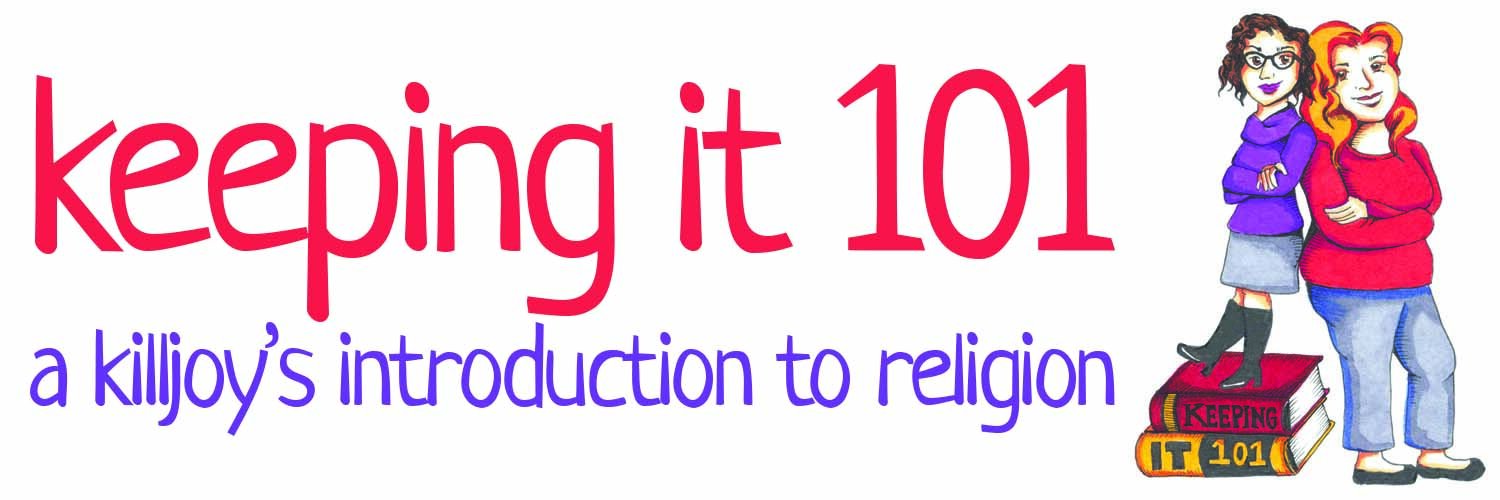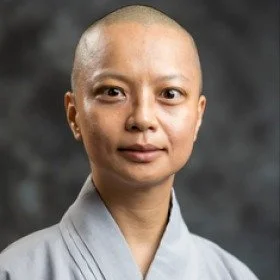Episode 413: Buddha’s Delight #1
Transcript! (because accessibility is mandatory)
PDF transcript. Also available via our Buzzsprout page.
Shownotes! (because citations are political)
More HISTORY OF THE WORLD (RELIGIONS), Part 1 coming for you! On this episode, we are ordering Buddha’s Delight #1 off the menu to dip our toes into this vast, multifaceted religion. This time around, we’re guided by Dr. Dixuan Yujing Chen, who is both a PhD-holding expert in Buddhism and a Mahayana Buddhist nun.
The 101! (in which we did the professor-work)
In this episode, we talked about Buddhism, because the world religions paradigm always has included it, but not always for the reasons we would think—or maybe even want.
Same basic lesson plan as always this season: knowing that religion is imperial helps us understand why Buddhism so often gets portrayed as a universal philosophy and is only really part of the Big 5 World Religions in the world religions paradigm because of how Christians imagine Buddhism relative to Christianity. And, as always, religious literacy requires us to know not just that Buddhist traditions exist in multiple forms and for multiple populations, but that Buddhist practices can be and are liberatory for its practitioners, divorced from text, influenced by region and language, and take on many, many forms.
In short, we’re arguing this episode that Buddhist traditions are an interesting case study to think about privilege and position in the world religions model, Buddhists are diverse and interesting, and you likely don’t know about that diversity because, despite having such a prominent slot in this silly model, Buddhists themselves aren’t often taken as seriously as the (read: white-washed) Buddhism of EuroAmerican imagination.
We talked Buddhism is an interesting case study to think about the world religions model, Buddhists are diverse and interesting, and Buddhist practices range from non-theistic to atheistic to theistic to, frankly, polytheistic. It’s rad and wild and wonderful.
We had three questions this episode:
We’ve seen the Buddha in our local garden stores as a tiny planter or as a landscaping/hardscaping statue. But who was this man who is maybe a god but also a lawn ornament?
Buddhism is a big, big term, and Buddhists themselves have different traditions within that. What are some of these traditions?
Let’s talk divinity in Buddhism. Because our favorite 19th century colonizers were obsessed with Buddhist philosophy but adamant that Buddhism was either non-theistic or, like, an enlightened form of monotheism, depending on the Orientalist. Put differently: What’s "divine” in Buddhism?
There were a bunch of WORDS OF THE DAY, too.
There are (small b) buddhas, enlightened beings who have totally realized and comprehended the Four Noble Truths; there are bodhisattvas, or folks who have awakened onto the path of becoming buddhas but delayed passing into nirvana to help other folks achieve enlightenment. There are the Wisdom Kings (vidyārāja), especially in Chinese Buddhism, who are sort of like embodiments of Buddha’s compassion (and in paintings they are super rad and fierce-looking); there are wrathful deities (yidam) that cause trouble; and then there are devas, who are deities but not necessarily Buddhist; and then there are also all the local, cultural, traditional divinities, deities, not-humans that show up in Buddhist practices, philosophies, stories, legends because—you’ll never believe this—Buddhists are people living in time and space. Which means that local ideas about spirits or ghosts or gods or humans with special powers or notions about ancestors and past lives and more — all of these exist in and next to and alongside other Buddhist ideas.
Guest Expert! (because together we are a genius)
Dr. Dixuan Yujing Chen is Assistant Professor of East Asian Religions at Grinnell College, whose research interests are really broad but include: Buddhist doctrines, Buddhist art, the history of Buddhism in China, the development of Buddhism in the West, and the mutual interactions between Buddhism and other religions.
Dr. Chen is also an ordained Buddhist nun of the Mahayana tradition, and takes time in her guest spot to teach us about multiplicity, the different ways Buddhists approach “dharma,” and why “Buddhism” might not be the best way we might think about this vast, ever-changing, multifaceted collection of practices.
We are so glad Dr. Chen joined us. Her distinctive sets of expertise makes this episode A+, if we don’t say so ourselves.
Little Bit Leave It! (in which we leave you a little bit to remember)
Megan told us that Buddhism makes the WRP roster not necessarily bc of how big it is BUT because it made sense to the folks who created that model. Buddhism, to their minds, is like Protestantism, eastern edition (even though Buddhism is millennia older than Protestantism). Which also made her remember what Dr. Rashid said about Catholic/Protestant divisions getting mapped onto Sunni and Shi’i Muslims.
Ilyse said that in the world religions paradigm, Buddhism has an odd place of prominence at the same time it experiences derision. When it became understood in the West as a universal philosophy... well, mix that with Orientalism and we can see how Buddhism is both everywhere and nowhere and sacred but also appropriated like all get out. We see that in the “scientific” adoption of meditation or mindfulness, which comes from “universal” goods in Buddhism that can be totally lifted from this religion, used by all (which one couldn’t do with, say, mindful or meditative practices of Islam). We see it in the Buddha planters at Lowe’s.
If You Don’t Know, Now You Know! (in which we get one factoid each)
Ilyse taught us that in some Vaishnava lineages—that is, Hindu traditions centered on Vishnu—the Buddha is understood as the ninth avatar of this Hindu deity.
Megan said that one of her favorite pieces of Buddhist trivia–-one that totally messes with my students’ sense of Buddhism as a nice, chill, aesthetically pleasing tradition, god/s or no god/s—is that there are Buddhist sects that sit for days with decaying corpses to meditate on the impermanence of flesh. So, yes, corpse meditation is her factoid for today.
Homework! (because there’s always more to learn)
Megan assigned: Like every episode this megaseason, we want y’all to go learn from our esteemed guest experts directly.
Dr. Dixuan Yujin Chen has a forthcoming book called Beyond Healing: The Worship of Medicine Master Buddha in China, keep your eyes out for it.
Dr. Chen publishes in a few languages beyond English—none of which we read. Here are some of those citations, because we know that our nerds are often smart at things we are not!
“Yinshun zhanglao dui chuqi dasheng wenshu lei jingdian zhi xiangquan yanjiu” (Yin Shun’s Views on the Early Mahāyāna Scriptures centered on Mañjuśrī). Zhuohui Shi ed., Yinshun daoshi yu ren pus axing wueshu yantaohui lunwen ji. Taiwan: Hsuan- Chuang University, 2006.
“Shisu jiaming shishe dao shengyidi de tisheng: Yi daborejing di si hui miaoxingpin wei zhongxin (The Transformation from Conventional Truth to Ultimate Truth: A Study on the Perfection of Wisdom in Eight Thousand Lines Scripture). Zhongding Shi ed., Fojiao xuesheng lunwen, vol. 2. Taiwan: Miaolin Press, 2003.
On Buddhism broadly Megan further suggests:
Amy Paris Landenberg, Buddha didn’t teach consent
Drs. Alison Melnick Dyer, Constance Kassor, and Ann Gleig on Classical Ideas podcast with Greg Soden
Liz Kineke for Tricycle – especially like her stuff on sound bath meditation: https://tricycle.org/author/lizkineke/
And finally I both will and won’t recommend the film Little Buddha (1993) bc it does include some good scenes that explain tenets of Buddhism–I was particularly struck by the explanation of reincarnation–but also it is CLASSIC good/bad/can’t tell Keanu Reeves acting, except that in this case Keanu is playing the literal big-B Buddha. I don’t know if I like it, but it has Stuck With Me. End of homework.
Ilyse also had homework!
Per my usual, I’m going to refer us back to Tomoko Masuzawa again. Her chapter on Buddhism in Invention of World Religions is great for all this history on how and when and why Buddhism “gets” to be world religion.
Damien Keown, Buddhism: A Very Short Introduction (2 ed.)
Buddhism in 5 Min / podcast interview
D. Mitra Barua, Seeding Buddhism with Multiculturalism: The Transmission of Sri Lankan Buddhism in Toronto (2019)
Survey driven work on how immigrant Sri Lankans transmit Buddhism in Toronto! My colleague and our next episode’s Buddhism expert, Tom Borchert, teaches this in his course on religion & globalization.
Jessica Falcone, Battling the Buddha of Love: a Cultural Biography of the Greatest Statue Never Built (Cornell UP, 2018)
This book I really love because it is about building a Buddhist statue in India, and it never happens, in part because Indian farmers themselves wanted to “save the land” from the Maitreya Project, this international Buddhist organization. It’s a wild story!
For a great piece on Buddhist nuns in China, see: Jue Liang’s “Buddhist Nuns and Female Scholars are Gaining New Leadership Roles”
Kevin Trainor, Relics, Ritual, and Representation in Buddhism: Rematerializing the Sri Lankan Theravada Tradition (Cambridge University Press, 1997).
Nerds of the Week! (because we love you for loving us)
Thanks for listening, rating and reviewing. This week’s nerd royalty are Ashley Reed, all the spotify users who can’t write reviews, and Kevin!!
IRMF really needs this decapitated Buddha planter trend to stop



